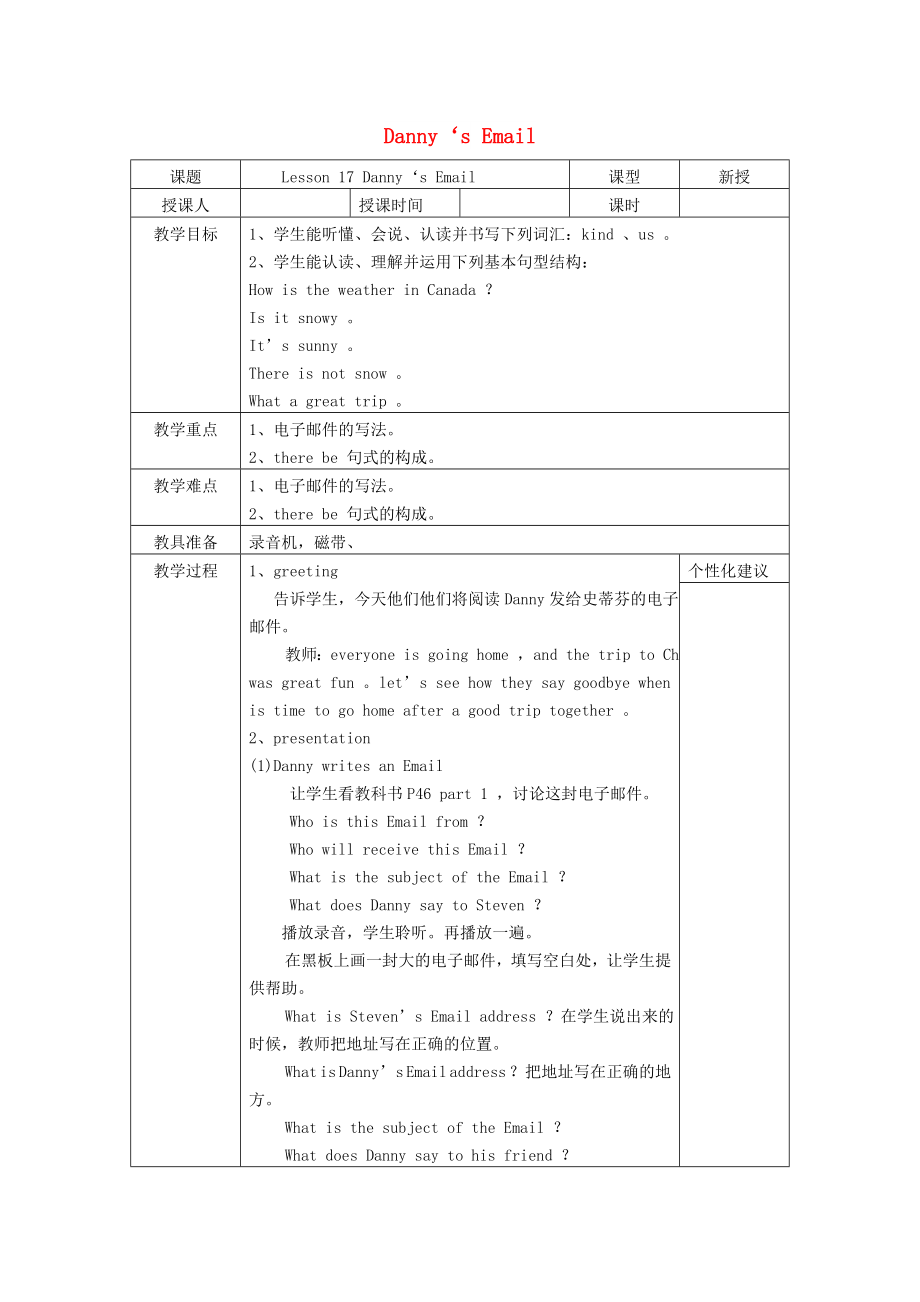《五年級(jí)英語(yǔ)下冊(cè) Lesson 17《Danny‘s Email》教案 (新版)冀教版》由會(huì)員分享��,可在線(xiàn)閱讀,更多相關(guān)《五年級(jí)英語(yǔ)下冊(cè) Lesson 17《Danny‘s Email》教案 (新版)冀教版(3頁(yè)珍藏版)》請(qǐng)?jiān)谘b配圖網(wǎng)上搜索����。
1、Danny‘s Email
課題
Lesson 17 Danny‘s Email
課型
新授
授課人
授課時(shí)間
課時(shí)
教學(xué)目標(biāo)
1���、學(xué)生能聽(tīng)懂、會(huì)說(shuō)�����、認(rèn)讀并書(shū)寫(xiě)下列詞匯:kind ���、us ���。
2���、學(xué)生能認(rèn)讀��、理解并運(yùn)用下列基本句型結(jié)構(gòu):
How is the weather in Canada ��?
Is it snowy ��。
It’s sunny �。
There is not snow ��。
What a great trip �。
教學(xué)重點(diǎn)
1���、電子郵件的寫(xiě)法����。
2、there be 句式的構(gòu)成��。
教學(xué)難點(diǎn)
1����、電子郵件的寫(xiě)法���。
2�、the
2、re be 句式的構(gòu)成�����。
教具準(zhǔn)備
錄音機(jī)�,磁帶���、
教學(xué)過(guò)程
1、greeting
告訴學(xué)生�����,今天他們他們將閱讀Danny發(fā)給史蒂芬的電子郵件�����。
教師:everyone is going home ,and the trip to China was great fun ��。let’s see how they say goodbye when it is time to go home after a good trip together ����。
2�����、presentation
(1)Danny writes an Email
讓學(xué)生看教科書(shū)P46 part
3��、1 ���,討論這封電子郵件�。
Who is this Email from ��?
Who will receive this Email �?
What is the subject of the Email ���?
What does Danny say to Steven �����?
播放錄音�,學(xué)生聆聽(tīng)�����。再播放一遍�����。
在黑板上畫(huà)一封大的電子郵件,填寫(xiě)空白處����,讓學(xué)生提供幫助�。
What is Steven’s Email address �?在學(xué)生說(shuō)出來(lái)的時(shí)候����,教師把地址寫(xiě)在正確的位置�。
What is Danny’s Email address ���?
4����、把地址寫(xiě)在正確的地方�����。
What is the subject of the Email ���?
What does Danny say to his friend �?
填滿(mǎn)所有的空之后�,讀一遍電子郵件���。然后讓不同的學(xué)生大聲讀出來(lái)����。提問(wèn)學(xué)生:Danny 告訴了Steven 關(guān)于中國(guó)的哪些內(nèi)容�?指出電子郵件中的新單詞kind。在黑板上寫(xiě):the people here are kind ���。向?qū)W生解釋?zhuān)琸ind指一個(gè)人非常友好和慷慨,愿意為他人做事情�,因?yàn)樗鸤她知道這會(huì)讓別人感到快樂(lè)。
再播放一遍錄音�����,學(xué)生跟讀�����。
師生演示:
教師:how is the weather in Beijing
5、 �?is it snowy ����?
學(xué)生:no �����,it’s sunny �����。there is no snow��。
學(xué)生自己練習(xí):
兩人一組練習(xí)��,每組就Danny 的電子郵件編一段對(duì)話(huà)。盡量涵蓋這些問(wèn)題�����。
What does Danny say about the people �?
When will Danny go back to Canada ?
What does Danny tell Steven about his trip ��?
(2)time to go home
四人一組,看課本P46 part 2����,瀏覽課文����,大聲的讀給學(xué)生聽(tīng)。然后在黑板上進(jìn)行記錄���。
道別時(shí)可以說(shuō)些什
6�、么:
What a fun trip !
_______ was great !
You’ll go back to _______ tomorrow .
We’ll miss you .
Don’t forget to write to us .
It was fun visiting china with you .
Thanks for looking after us .
What a great trip !
I hope you come back again .
向?qū)W生解釋?zhuān)@是在旅行之后要告別時(shí)彼此說(shuō)的一些話(huà)�。教給學(xué)生如何表達(dá)這些語(yǔ)句�。
播放錄音����,學(xué)生跟讀
7��、。
現(xiàn)在�,讓各個(gè)小組練習(xí)在機(jī)場(chǎng)告別時(shí)的對(duì)話(huà)��。
(3)let’s do it .
讓學(xué)生看P47 part 3 ���,說(shuō)明任務(wù)要求。他們要閱讀Steven給Danny 的電子郵件�����。然后����,讀郵件下面的句子��,判斷正誤���。根據(jù)自己的判斷打?qū)椿虍?huà)叉��。
√×√××
(4)listen and repeat ��。
用幾分鐘的時(shí)間來(lái)討論發(fā)音的問(wèn)題。提醒學(xué)生發(fā)音很重要���。在英語(yǔ)中,有很多次發(fā)音很難�����。有時(shí)一個(gè)詞以某種發(fā)音結(jié)尾�����,后面的詞以另一種發(fā)音開(kāi)頭�����,這兩個(gè)詞一起讀出來(lái)會(huì)很難���。
讓學(xué)生看P47 的底部���,指著每個(gè)單詞組合,慢慢的讀出來(lái)�����。每個(gè)單詞組合讀兩到三次�,然后讓學(xué)生重復(fù)。繼續(xù)這個(gè)過(guò)程���,知道讀完這八個(gè)組合����。
現(xiàn)在����,播放錄音,根據(jù)需要暫停��。學(xué)生應(yīng)該跟著錄音盡力讀出這些單次連續(xù)�����。
(5)鞏固檢驗(yàn)����。
(6)家庭作業(yè)�。
隨堂練習(xí)冊(cè)�����。
(7)結(jié)束課堂教學(xué)�����。
個(gè)性化建議
板書(shū)設(shè)計(jì)
Lesson 17 Danny‘s Email
Kind miss forget famous
People here are kind ����。
I’m coming home to Canada on February 8 �����。
Don’t forget to write to us ����。
教學(xué)反思
 五年級(jí)英語(yǔ)下冊(cè) Lesson 17《Danny‘s Email》教案 (新版)冀教版
五年級(jí)英語(yǔ)下冊(cè) Lesson 17《Danny‘s Email》教案 (新版)冀教版

